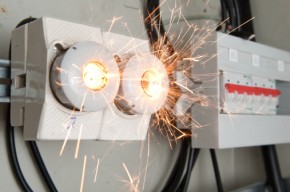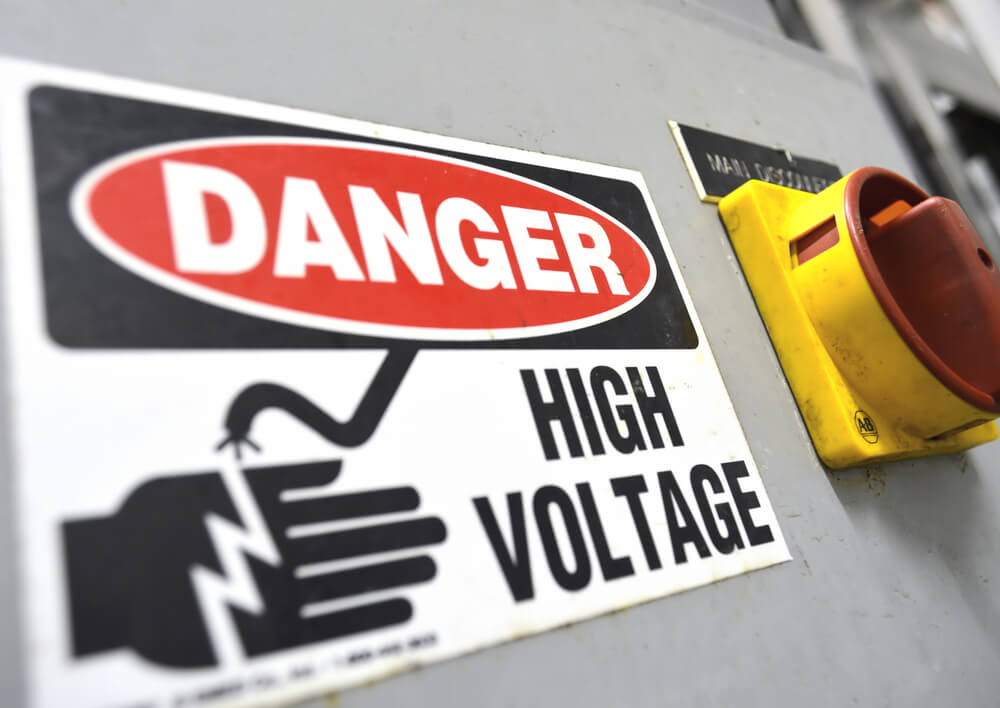Electrical Accidents
Practice Areas
 Shocking Statistics
Shocking Statistics
The number of American workers electrocuted on the job and experiencing fatal work-related injuries continues to rise. Contact with overhead power lines accounts for approximately two fifths of fatal electrocutions. Electrical accidents account for one-tenth of all job-related fatalities as well as scores of serious injuries. One of the major electrical hazards is shock: what happens when electric current goes through the human body because a wire has not been enclosed properly, or has defective insulation, or because a worker has made direct contact with “live” electricity such as a power line.
The risk of serious injury increases with the length of contact with electric current, especially if the current enters the body near the heart. It does not take much power for an electrical accident to cause death in the form of electrocution.
Electrical accidents resulting in shock can also cause pain; loss of muscle control and coordination; internal bleeding; damage to nerves, muscles or tissues; and cardiac arrest. Employees can become further injured by falling after receiving an electric shock.
Causes of Electrical Accidents
Electricity and water are a deadly combination. When water creates moisture in the air or on the skin, it can change the body into a conductor. If a worker with wet or sweaty hands plugs in an electrical device, an electrical accident can result in shock.
Another type of electrical accident is electric burn. If employees touch overheated equipment, or if current flows through the body, the result can be serious burns of skin and/or internal tissues.
Overloading circuits or equipment can also cause an electrical accident when overheating results in a fire or explosion. This is especially dangerous in areas that contain flammable or explosive substances.
Electrocution Burns
The most common shock-related injury is a burn. Burns suffered in electrical accidents may be of three types: electrical burns, arc burns and thermal contact burns. Electrical burns are different than thermal and chemical burns since they tend to have deeper surface penetration.
Electrical burns result from electric current flowing through tissues or bone. The type and voltage of the circuit, the pathway through the body, the duration and the resistance of the body will determine the severity of damage. A key characteristic of electrical burns is that there is an exit wound. This is the location where the electricity leaves the body. A person with an electrical burn in his or her arm may have another wound in the leg. Because the electricity runs through the body, it is important to know the effects the burn had on the muscles, veins, arteries, and nerves between the entry point and the exit point of the electricity.
Entry points are most commonly in the hand. If the exit point is the opposite hand, it may be likely that the electricity ran through the heart. At levels of current flow exceeding 1/10 of an amp or 100 milliamps, the heart stops and experiences fibrillation. A person may survive an electrocution if his or her heart can be started again. This is why CPR is such an important skill in the electrical industry. Remember, electrical burns are one of the most serious injuries you can receive and should be given immediate attention.

Another type of shock-related injury is an arc or flash burn. These burns are the result of high temperatures near the body and are produced by an electric arc or explosion. They are usually serious and should be attended to promptly.
Thermal contact burns are those normally experienced when the skin comes in contact with hot surfaces of overheated electric conductors, conduits, or other energized equipment. Additionally, clothing may be ignited in an electrical accident and a thermal burn will result. Electrical, Arc and Thermal burns may be produced simultaneously in an accident.
Electric shock can also cause injuries of an indirect or secondary nature in which involuntary muscle reaction from the electric shock can cause bruises, bone fractures, and even death resulting from collisions or falls. In some cases, injuries caused by electric shock can be a contributory cause of delayed fatalities.
In addition to shock and burn hazards, electricity poses other dangers. For example, when a short circuit occurs, hazards are created from the resulting arcs. If high current is involved, these arcs can cause injury or start a fire. Extremely high-energy arcs can damage equipment, causing fragmented metal to fly in all directions. Even low-energy arcs can cause violent explosions in atmospheres that contain flammable gases, vapors or combustible dusts.
Avoiding Electrical Accidents
There are a number of commonsense safety procedures that can help prevent electrical accidents. For example, employees should:
- Inspect electrical equipment and wires before use to make sure they’re properly insulated and grounded and that electrical connections are tight.
- Avoid de-energizing or re-energizing live parts unless employees have been properly trained to follow specific procedures such as turning off power at the switch box, and then locking out and tagging the switch so it cannot be turned on accidentally.
- Use protective equipment such as rubber gloves or boots when working with electrical equipment.
- Avoid using extension cords whenever possible.
- Make sure electric plugs match their receptacles; never alter a plug.
- Refrain from using any piece of electrical equipment that sparks, smokes, smells or shocks.
- Never use a metal ladder around live electricity.
- Obey barriers, signs and other warnings to stay away from electrical equipment.
- Practice good housekeeping procedures such as not allowing grease, dust or dirt to build up on machinery and never leaving electrical cords tangled or lying across an area where people walk.
Omaha Electrocution Accident Attorney
Injury Lawyer Omaha has successfully represented numerous electrocution accident victims in Omaha, California and nationwide. The law firm has the compassion, resources and experience to consult the unfortunate victims of electrocution. For a free consultation from a nationally recognized electrocution injury lawyer, please contact (402) 513-9784 or fill out the contact form and a specialist will be in touch shortly.
FREE Initial Consultation!
Testimonials
This firm did a fantastic job handling my personal injury case. They kept me informed every step of the way with what was happening with my case and always answered any of my questions. I would highly recommend this firm. Great job
- Shateeka Spinks
I am really glad I worked with Abboud law firm. They were very helpful and accommodating. Everyone was very friendly and genuinely had my best interests at heart. I would recommend them to anyone.
- Ameneh Alhaidari
Abboud law firm took amazing care of me after my accident and was able to settle my claim wonderfully. They work very well with me and everyone involved. I would highly recommend using Abboud Law.
- Apolla Speck
Chris has been fantastic throughout this process after my accident and his staff has always been friendly and helpful. He managed to get me 3x what I expected. No complaints here. Definitely recommend.
- Jesse Charles
I had a very nice experience with Abboud!! They were very patient and understanding about my situation and kept me informed with what was going on with my settlement. Would serenity recommend
- Blake Lucey


